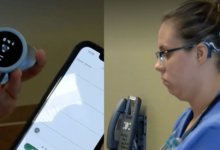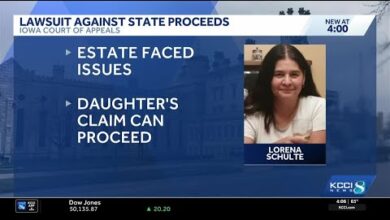Paediatric nurses petition for Israel-Palestine ceasefire

A group of paediatric nurses has led a petition calling for an immediate and indefinite ceasefire between Israel and Palestine to prevent further deaths and to ensure humanitarian aid can reach those impacted by the conflict.
The UK Medical Coalition launched the petition after UK parliament rejected calls to back a ceasefire in the conflict between the Israel Defence Force (IDF) and Palestinian militant group Hamas.
“I know that there are a lot of healthcare workers who have felt very isolated and helpless”
UK Medical Coalition spokesperson
The petition, which had been signed by 755 UK health and care staff at the time of writing, including more than 200 nurses, was handed into 10 Downing Street on 25 November. It is still open for signatures.
To date, the Hamas-led health ministry has said that more than 15,000 civilians have been killed during Israeli military strikes on the Gaza Strip.
In addition, the ministry said the bed occupancy rate in Gaza operational hospitals is 171%, while the intensive care unit is up to 221%.
The IDF assault follows the 7 October Hamas attack in Israel, which killed at least 1,200 people and resulted in more than 200 Israelis being held hostage.
Last week there was a temporary truce period between the IDF and Hamas, in which Hamas released some of these hostages in exchange for Israel releasing Palestinian prisoners.
Under the truce, all fighting was paused and humanitarian aid was allowed into Gaza.
However, due to negotiations falling apart, the IDF has resumed its bombardment in Gaza.

UK Medical Coalition handing its petition to 10 Downing Street on 25 November 2023
The UK Medical Coalition petition has outlined five demands, which it said would stop the “indiscriminate suffering” that is happening because of the conflict.
Chiefly, signatories have demanded that the UK Government calls for an immediate ceasefire.
A spokesperson for the UK Medical Coalition, who is a paediatric nurse, told Nursing Times: “I’m sure we can all agree that we believe in the preservation of human life.
“We believe in no deaths.”
The nurse added: “We condemn the killings of anyone who is innocent, being Israeli [or] being Palestinian.”
The petition has also called for “full access of emergency aid to freely enter Gaza” to restore access to clean water, electricity, fuel, food, medicine and shelter.
In addition, it has urged for a “humanitarian safe corridor” to treat injured or unwell medical professionals and civilians, including giving them a safe passage out of Gaza where necessary.
Meanwhile, signatories have urged the UK Government to condemn attacks on protected facilities, including schools and hospitals.
In addition, the petition has advocated the supporting of UK-based healthcare colleagues affected by these events and to also “acknowledge the psychological effects” from the increase in Islamophobia and antisemitism.
The spokesperson for the UK Medical Coalition warned that the conflict had “given more rise” to anti-Arab, Islamophobia and antisemitic comments which were being directed at healthcare workers in the UK.
“I know that there are a lot of healthcare workers who have felt very isolated and helpless,” they said.
They said healthcare staff across the world had been left “traumatised and very helpless” as they look on at the bloodshed taking place in Gaza.
“We do feel like we’re in limbo, we’re trying to do as much as we can,” they said.
“Don’t fall into despair, there is work that can be done.”
This is not the first call from the nursing workforce for a ceasefire.
Back in October a letter co-signed by 27 UK healthcare associations asked the prime minister Rishi Sunak to take action to secure peace.
International health organisations are also among those to call for a ceasefire.
Yesterday, the World Health Organization (WHO) appealed in a statement on X, formerly Twitter, for a sustained ceasefire and protection of the health system from further attacks.
From 7 October to 28 November, it said it had recorded 203 attacks on hospitals, ambulances and medical supplies, and also the detention of healthcare workers.
The WHO said: “In less than 60 days, the number of functioning hospitals has dropped from 36 to 18.
“Of these, three are only providing basic first aid, while the remaining hospitals are delivering only partial services.
“Those able to admit patients are delivering services well over their intended capacities, with some treating two to three times as many patients as they were designed for.”
The WHO warned that, in Gaza, there was “a shortage of health workers compared to the overwhelming needs”.
“Those who are available have been working non-stop and are exhausted,” said the statement.
When asked to comment, the UK Foreign, Commonwealth and Development Office directed Nursing Times to a statement that the parliamentary under-secretary of state, Leo Docherty, made yesterday in parliament.
Mr Docherty said: “The pause that ended last week was a crucial step towards providing relief to the families of the hostages and addressing the humanitarian crisis in Gaza.
“We have said repeatedly that we would like to see an extension.”
He explained that UK humanitarian funding would “continue to support trusted partners to provide humanitarian assistance and negotiate humanitarian access” in Gaza.
In addition, he said that the UK would “advocate internationally on humanitarian priorities” including respecting international humanitarian law.
Mr Docherty added: “We remain committed to making progress towards a two-state solution.
“Britain’s long-standing position on the Middle East peace process is clear: we support a negotiated settlement leading to a safe and secure Israel living alongside a viable and sovereign Palestinian state.
“The UK will continue to work with all partners in the region to reach a long-term political solution that enables both Israelis and Palestinians to live in peace.”







